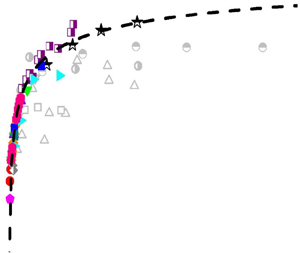Published online by Cambridge University Press: 15 December 2020

The celebrated wall-scaling works for many statistical averages in turbulent flows near smooth walls, but the streamwise velocity fluctuation,  $u^{\prime }$, is thought to be among the few exceptions. In particular, the near-wall mean-square peak,
$u^{\prime }$, is thought to be among the few exceptions. In particular, the near-wall mean-square peak,  $\overline {u'u'}^+_p$ – where the superscript
$\overline {u'u'}^+_p$ – where the superscript  $+$ indicates normalization by the friction velocity
$+$ indicates normalization by the friction velocity  $u_\tau$, the subscript
$u_\tau$, the subscript  $p$ indicates the peak value and the overbar indicates time averaging – is known to increase with increasing Reynolds number. The existing explanations suggest a logarithmic growth with respect to
$p$ indicates the peak value and the overbar indicates time averaging – is known to increase with increasing Reynolds number. The existing explanations suggest a logarithmic growth with respect to  $Re$, where
$Re$, where  $Re$ is the Reynolds number based on
$Re$ is the Reynolds number based on  $u_\tau$ and the thickness of the wall flow. We show that this boundless growth calls into question the veracity of wall-scaling and so cannot be sustained, and we establish an alternative formula for the peak magnitude that approaches a finite limit
$u_\tau$ and the thickness of the wall flow. We show that this boundless growth calls into question the veracity of wall-scaling and so cannot be sustained, and we establish an alternative formula for the peak magnitude that approaches a finite limit  $\overline {u'u'}^+_\infty$ owing to the natural constraint of boundedness on the dissipation rate at the wall. This new formula agrees well with the existing data and, in contrast to the logarithmic growth, supports the classical wall-scaling for turbulent intensity at asymptotically high Reynolds numbers.
$\overline {u'u'}^+_\infty$ owing to the natural constraint of boundedness on the dissipation rate at the wall. This new formula agrees well with the existing data and, in contrast to the logarithmic growth, supports the classical wall-scaling for turbulent intensity at asymptotically high Reynolds numbers.
To send this article to your Kindle, first ensure no-reply@cambridge.org is added to your Approved Personal Document E-mail List under your Personal Document Settings on the Manage Your Content and Devices page of your Amazon account. Then enter the ‘name’ part of your Kindle email address below. Find out more about sending to your Kindle. Find out more about saving to your Kindle.
Note you can select to save to either the @free.kindle.com or @kindle.com variations. ‘@free.kindle.com’ emails are free but can only be saved to your device when it is connected to wi-fi. ‘@kindle.com’ emails can be delivered even when you are not connected to wi-fi, but note that service fees apply.
Find out more about the Kindle Personal Document Service.
To save this article to your Dropbox account, please select one or more formats and confirm that you agree to abide by our usage policies. If this is the first time you used this feature, you will be asked to authorise Cambridge Core to connect with your Dropbox account. Find out more about saving content to Dropbox.
To save this article to your Google Drive account, please select one or more formats and confirm that you agree to abide by our usage policies. If this is the first time you used this feature, you will be asked to authorise Cambridge Core to connect with your Google Drive account. Find out more about saving content to Google Drive.